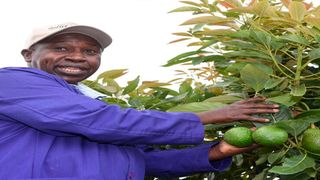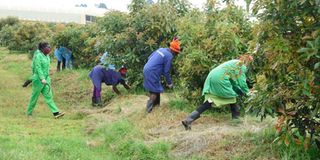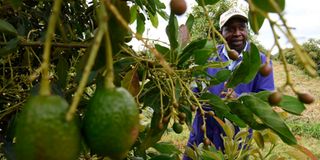
Andrew Tubei, the General Manager of Sololo Agriculture Limited in Uasin Gishu County at the farm on October 31, 2021.
| Jared Nyataya | Nation Media GroupSeeds of Gold
Premium
How we grow our avocados for export
What you need to know:
- The price of avocados in the international market has been on the rise lately, hitting a high of Sh200 per kilo.
- But what does it take to farm export quality avocados that would not be rejected in the global market?
The leaves of hundreds of avocado trees on the farm located off Marura-Koshin Road in Uasin Gishu County sway to the morning wind.
The 200-acre farm named Sololo mainly hosts the Hass avocado plants on 65 acres while summer flower sit on about 50.
“We have 14,000 avocado trees, we farm the fruits for the export market. We farm Hass variety because it is highly productive and is loved in the export market, but we intercrop with Fuerte, which also has good market in the Middle East and Russia,” Andrew Tubei, the general manager, says.
The price of avocados in the international market has been on the rise lately, hitting a high of Sh200 per kilo, what has made many join the trade.
But what does it take to farm export quality avocados that would not be rejected in the global market?
“The best way to go about it is farm them organically,” says Tubei, a graduate of Egerton University.
“We cultivate our crop using farm manure mainly and use traps and various biological measures to control notorious pests and diseases such as false codling moth (FCM), fruit fly and phytophora.”
For FCM and fruit flies, they adopt preventive measures, that is, remove hosts like wild fruits and preserve natural enemies like ants, rove beetles and parasitic wasps.
Regular scouting is also key to detect fruits with oozing sap and look for pupae beneath the plants.
Tubei notes that the export market is sensitive to chemicals.
“Since avocados are eaten raw mainly, a farmer should focus on supplying produce that has minimal or no chemical residue,” he says.
Going organic, according to him, comes with double benefits as the produce also fetches higher prices.
All activities on the farm, that is social – for staff, good agricultural practices and crop protection practices and nutrition programs and environmental – energy /solar, water usage, protection of environment, must be documented if one is farming for export. One should also invest in traceability mechanisms, says Tubei.
To ensure they end up with good quality fruits, they grow their own seedlings.

Workers at Sololo Agriculture Limited in Uasin Gishu County weed avocado trees at the farm on October 31, 2021.
“Currently, we have 4,000 seedlings that we have grafted. The root stock comes from indigenous varieties while scion is the original Hass variety,” says Tubei, adding by growing their own seedlings, they are sure of the crops they farm.
The seedlings are planted after about a year on a farm where they have done deep chiseling and make raised beds.
The recommended planting spacing is seven metres between rows and five metres from plant to plant.
“This production system is low density, guaranteeing long-term harvesting after five years onwards, targeting a yield of 1,000 fruits per tree,” says Tubei, adding the trees mature in about nine months.
The crop has shallow roots, thus, they plant the seedlings on ridges that are 1.5 metres wide and a metre high.
Their crops are grown under irrigation to ensure they do not suffer in case of erratic weather.
“We have a 150,000 litres water reservoir where we store water for irrigation. We use solar energy to irrigate the crop, what saves us up to 70 per cent of the costs,” he notes.
Pruning in first years must be done to encourage lateral growth and multiple frame work branching. Sucker growth must also be continuously stopped by removing all shoots originating from below the grafting joint.
In later years, pruning is done to influence the size, quality and quantity of the fruit.
At harvesting, he says avocado fruits should never be pulled of the tree as this damages the skin and allows decay diseases to enter.
“Fruits are clipped using secateurs, in such a way that a short stem portion of 0.5 cm is left. We recommend the use of cotton gloves during picking and grading.”
“Never drop the fruits and never place them on the ground without some protection underneath. Put them in a crate,” he adds.
After harvesting, they do grading and sorting for delivery to registered exporters they work with. The delivery is done the same day in the night using refrigerated trucks.

Andrew Tubei, the General Manager of Sololo Agriculture Limited in Uasin Gishu County at the farm on October 31, 2021.
“We started farming the crop because our customers in the international market asked for it whenever we would go to flower exhibitions,” says Tubei of the farm that belongs to Moi-era politician Joshua Kulie.
In July, they harvested 50 tonnes that they exported cashing in on increased demand.
Tubei observes that avocados are a lucrative crop since from an acre, one can reap up to Sh1 million, which is ten times what maize offers.
“The thing is start small then expand. Consumption globally is growing; we have done our own research, 10 years ago, in Europe, people used to consume on average a kilo of avocados each a year, currently they doing 5kg per person,” he adds.
Tubei notes they plan to expand the acreage from current 65 hectare to 100 under the crop and set up a processing factory on the farm.
Besides, growing avocados, they also keep bees in 300 hives that support their 550 farm workers as part of sustainability programmes.
“This is an internationally recognised fair trade practice but the insects also help us pollinate the fruits and the summer flowers like alstroemeria’s, delphiniums and eryngiums.”
They use income from bees to support the welfare of the workers. “The money helps us offer the workers bursaries so that they can educate their children.”
Their avocados have once been rejected in the market due to skin lesions and being over-ripe, but Tubei blames this on the exporting agent.
Dr Daniel Chebet, a pomologist (fruit expert) based at the Department of Seeds, Crops and Horticultural Science, University of Eldoret, explains that spacing and getting the right rootstock is important to attaining higher yields and controlling pests and diseases when growing avocados.
“Hass variety is highly susceptible to phytophora rootstock fungal disease. One mistake most farmers make when planting the crop is putting the seedlings in the hole and covering until the soil comes into contact with the scion. This exposes the crop to the pest,” says Chebet.
According to him, what farmers should do is apply the beneficial fungus (Trichoderma) that feed on the harmful pests in the soil at planting and once a year.





